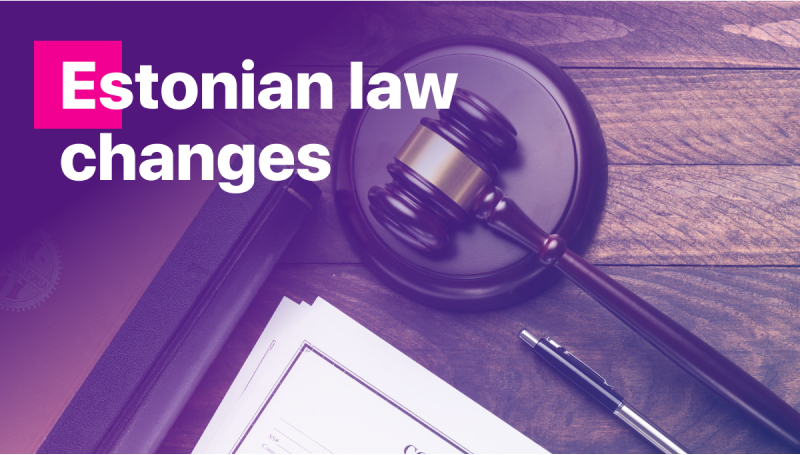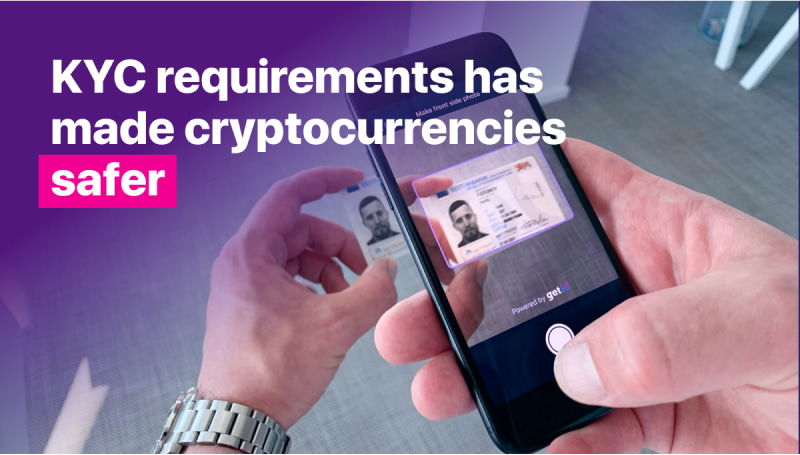
A Complete 2020 Guide to Cryptocurrency License Requirements in Estonia
27 Jun 2020
Last week Anti-money laundering agency (Financial Intelligence Unit, FIU) issued its updated annual report. As usual, this report is worth reading and contains a lot of information. According to the Annual report in 2019 alone, 667 new licenses to exchange fiat money for cryptocurrencies were issued in Estonia. In this article, we will discuss why Estonia is one of the best places in the world to obtain a crypto license and which services can help to stay compliant with all the modern regulations.
The History Of Cryptocurrency Regulations in Estonia
Today we are going to discuss what the FIU thinks was the most crucial topic of the previous year – cryptocurrency regulation and new rules of the Estonian market.
According to the Annual report in 2019 alone, 667 new licenses to exchange fiat money for cryptocurrencies were issued in Estonia.
And, as everybody interested or working in the crypto industry surely knows, at the end of last year, many (about 500) of such licenses were revoked in Estonia (our residence country). The main reason was (no, not potential money laundry scandals in Estonian banks) the fact that most of the companies never began their operation. Yes, the very fact that a company has not commenced operation in the requested field of activity within six months from the issue of the authorization forms a legal basis, so buying a company just in case is not the wisest of decisions.
Why did not the companies commence operation? Maybe, because the industry does not look like the Wild West anymore, and the actor has to follow the new rules. The rules that will very soon perfectly mirror the rules of the classic financial sector. Let us go more in-depth.
We are going to recall history in order to understand what has changed.
Do you remember when the first cryptocurrency appeared? Not long ago, just in 2009, a person or a group of people under pseudonym Satoshi Nakamoto developed bitcoin, where the industry began. Only 11 years later, the capitalization of the industry exceeds billions of dollars. Bitcoin alone transactions amount to an average 300.000 a day. Regulators were not so quick to react. And in the lack of the rules, always there is somebody to use (or abuse) this gap. DARKNET, financing terrorism and extremist movements, avoiding international sanctions, “investment” fraud – the list is long.
The result is that many countries are very cautious about the industry and even completely restrict the circulation of cryptocurrencies.
Luckily, many countries nevertheless have chosen the path of regulations and, as we promised, here we are going to clarify what is going on.
Today Estonia is on the spot. The laws of Estonia mentioned “crypto” for the first time in 2017. In 2017 Estonia was the first country to implement into the national laws EU Directive 2015/849, which in turn was the first law to set the European legal framework for virtual currencies.
As a result, Estonia became a very popular country among businessmen willing to legalize their business activities.
At the end of the last year, the Ministry of Finance initiated a public discussion of potential new rules for the crypto markets. Both the local crypto community and the public sector took part in the discussion. It is highly likely that we will see more moves towards the control of the market before the end of the year, and it will definitely improve the crypto-friendly status of our country.

Estonian Law Changes
Let us see how exactly the Estonian law changes as from July 1st, 2020 and how GetID service helps you to meet the new requirements.
General license
One license (Provider of virtual currency service) will substitute two previously existing licenses (Providing a virtual currency wallet service and Providing services of exchanging a virtual currency against a fiat currency).
Document submission
All the licensing-related documents shall be submitted through Notary Public or electronically through the Business Register.
Resolution of Application. At the discretion of the FIU, the period to make a decision on the application for the license can be extended to 120 days from the current 60.
Licensing Fee
The governmental charge payable to obtain a license for the crypto-related services will increase to 3300 EUR from the current 345.
Fit and Proper
The people on the key positions in the virtual currency service providers shall have a perfect reputation, and this is another essential novation.
The Fit-and-Proper procedure has long been a norm in the world of finance aimed at ensuring that the reputation and particularly the experience of the people who take care of your money (now also in the form of virtual currency) have been verified and meet the high standards.
According to the new rules, applying for the license, you have to be ready to provide a full set of certificates and other documents confirming your education, relevant experience, clear criminal record, and no other reasons to doubt your reputation.
The personal checks can be performed, at least partially, with the GetID service.
Business location
The legal entity that offers any virtual currency-related service shall be located and operating in Estonia. This should be mentioned in the Articles of Association and registered in the Business Register.
It is essential to understand that it is not enough to make a “virtual office” or rent an office space for a couple of hours. Both the business activities and the people who do it shall be physically connected to the license-issuing country. Those who do not have such a connection, can establish a subsidiary in the country of the service.
Again, this is nothing new for the “classic word of finance.” For example, under Article 39 of MiFID II, an investment firm established in a third country intending to provide investment services or performing investment activities with or without any ancillary services to retail clients or professional clients in the territory of any Member State must establish a branch in that Member State.
So we see that the crypto world follows the example of the financial world in many aspects.
Having a local branch allows for the most efficient control over the service provision, which is vital to ensure the best protection of the rights and assets of the clients, buying the financial service.
Financial service
In the previous clause, we said that cryptocurrency services are financial services. And this is not a mistake. According to the new rules, the provisions of Estonian AML law governing financial institutions apply to virtual currency service providers. Including all the user identification rules. Below, we will discuss it in detail.
The good news is that GetID has been working with the financial sector for years, and therefore we will quickly find a suitable solution for your business.
Payment account
A payment account in a credit institution, e-money institution or payment institution that has been established in Estonia or a contracting state of the European Economic Area and provides cross-border services in Estonia or has established a branch in Estonia.
This requirement might become a stumbling block for many service providers, given that up to now, not many financial institutions were eager to work with the poorly regulated crypto industry. We believe that now, as the regulations will be almost identical to those of the financial world, the reputation of the industry will improve significantly, and the banks will be easier to deal with.
By the way, it is worth mentioning here that while Brexit is not completed, the payment account can be opened in a UK financial institution.
Capital
The new requirement for the minimum authorised equity is 12,000 EUR. And the whole sum shall be paid in a money equivalent, which is important. Or at least in a cryptocurrency (NB! this is the issue to discuss with your own auditor and FIU). We have seen this already.
We believe that this is a reasonable decision, as this amount seems insufficient, given the level of the workforce expenses and IT costs.
Current business
Everything described above applies both to the businessmen who plan to acquire a license in Estonia and to those who have this license.
Please check the requirements one by one and make sure your company complies. Submit the documents to FIU through The Register of Economic Activities or Notary Public.
For example, to prove that your current directors, procurists, or beneficiaries meet the above mentioned requirements of the perfect reputation, you will have to attach documents or explanations concerning the previously appointed people too.
Contact person
If you have not appointed a contact person for FIU, be sure to do it and check your internal documents for compliance with the new rules. For example, check that you have made and submitted to FIU your risk appetite framework.
GetID has been working with financial companies for years, and we see that all the above-described requirements are successfully implemented in the financial sector. We are sure that the crypto industry will meet it easily too. And you can always rely on us, at least in the KYC sphere!
As we said, the KYC requirements now are the same as for the financial companies. Let us see what it means for individuals.
There are two levels of requirements:
- A person from a contracting state of the European Economic Area or whose place of residence or seat is in such a country and whose total sum of outgoing payments relating to a transaction or a service contract exceeds 15,000 euros per calendar month or, in the case of a customer who is a legal person, 25,000 euros per calendar month, and where the due diligence measures are not applied while being physically in the same place as the person or their representative.
In this case, the law says that a person may be identified by asking his/her name, date of birth and location, and verification of the submitted information based on information obtained from a reliable and independent source. We dedicated a whole article to describe what is considered a “reliable and independent source.” Now we are sure that GetID will find the best solution for your business to meet this legal requirement. - All others. In this case, the law requires you to hold a video interview. Same as in the office, but using video equipment. Here are the exact technical requirements of the procedure.
Those are the requirements of the first level of checks. KYC is the regulation for big players. For example, Idex introduced the checks “as early as” 2018.
Enhanced Due Diligence
Enhanced Due Diligence (EDD). As we have mentioned more than once, KYC is a complicated process and though the primary verification is important, the real understanding of the client, their risk level, or the additional measures that might be necessary, come as a result of the analysis of their transactions, behavioral patterns, and regular updates of the data received. It is also important to apply different measures to clients with different risk levels. Those who want to trade legally in the cryptocurrencies, should understand what blockchain analysis is and how to use it, clarify the inherent risks of anonymous currencies and most probably refuse to deal with them (like Japan did it at the governmental level), familiarise with how so-called cryptocurrency mixers work and why they can be dangerous to use in chain transactions.

Conclusion
Generally, the implementation of the KYC rules and requirements has made the cryptocurrencies less attractive for criminals. We are sure that regulations will finally bring the real money (from the government and institutional investors) to the market and put an end to the Wild West period.
Any regulation is founded on a real-life problem, like money laundering or financing terrorism. And choosing the way to follow the rules, it is crucial not to make the business too complicated and non-competitive. We created GetID to help you fulfill the laws and be one step ahead of your competitors. We can do this because the service is easily adaptable to your business and makes your KYC procedure efficient without being too complicated for your clients. Sounds interesting? Contact the GetID team to get more information about GetID solutions or to book a product demo!